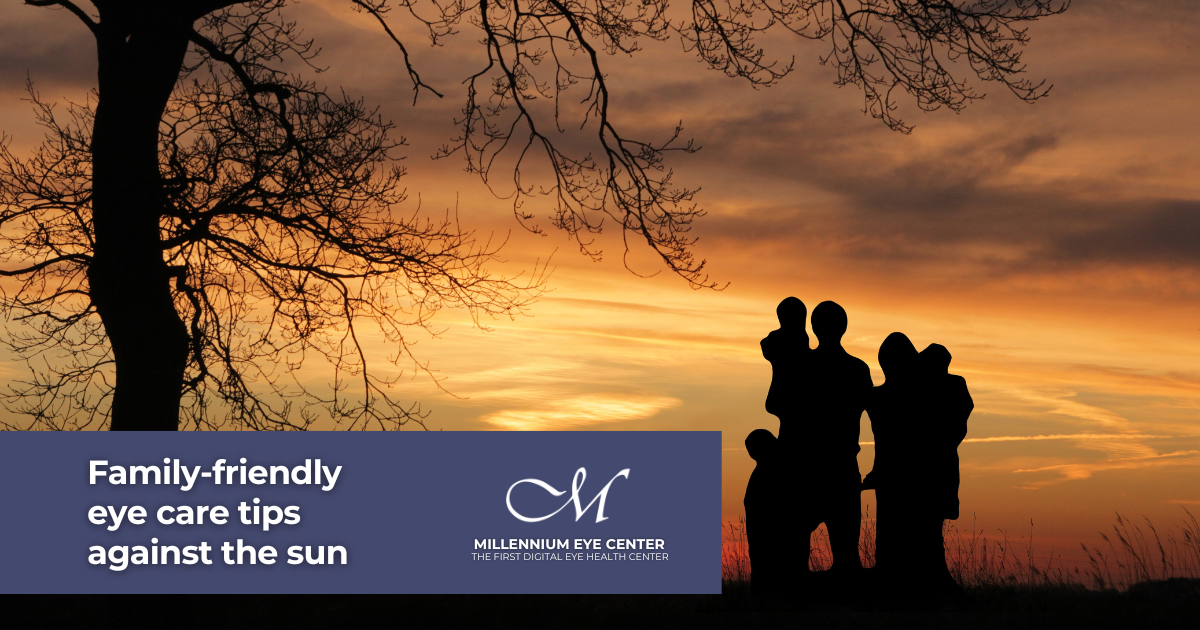We all love basking in the glorious sunshine, whether it’s a family picnic, a day at the beach, or just playing in the backyard. We diligently slather on sunscreen to protect our skin, but have you ever stopped to think about the delicate wonders that are your family’s eyes? As an optometrist, I often remind my patients that sun protection isn’t just for your skin – it’s absolutely vital for healthy vision throughout life!
Think of your eyes like tiny, intricate cameras, constantly taking in the world around you. Just as prolonged sun exposure can damage your skin, the sun’s powerful ultraviolet (UV) rays can inflict serious harm on your eyes. Over time, this cumulative damage can contribute to conditions like cataracts, macular degeneration, and even growths on the eye’s surface. And here’s a crucial point: children are especially vulnerable! Their developing eyes are more transparent, allowing more harmful UV light to penetrate and reach the retina. This means their lifetime exposure to UV radiation begins early, making proactive protection paramount.
So, how can you become a “sun smart” family when it comes to eye health? It’s simpler than you think!
-
Sunglasses are Non-Negotiable – For Everyone!
This is your first line of defense. Look for sunglasses that block 100% of both UVA and UVB rays. Darker lenses don’t automatically mean better protection – always check the label! For little ones, invest in sunglasses specifically designed for children; adult frames won’t offer the right fit or coverage. Make it a fun habit – let them pick out their favorite colorful frames!
-
Hats Are Your Eyes’ Best Friend:
A wide-brimmed hat provides an extra layer of shade, significantly reducing the amount of UV light reaching the eyes and the sensitive skin around them. Combine a cool hat with stylish sunglasses for ultimate protection!
-
Seek the Shade:
Whenever possible, encourage your family to enjoy outdoor activities in shaded areas, especially during the sun’s peak hours (typically between 10 AM and 4 PM). Whether it’s under a tree, an umbrella, or a pop-up tent, shade offers a welcome reprieve from intense UV exposure.
-
Be Mindful of Reflective Surfaces:
Water, sand, snow, and even concrete can reflect UV rays, essentially doubling your exposure. This is why sunglasses are particularly important at the beach, by the pool, or on snowy slopes.
-
Lead by Example:
Children learn by watching you! Make sun-protective habits a family affair. Wear your sunglasses, don your hats, and discuss why it’s important to protect your eyes.
At Millennium Eye Center, we’re passionate about helping your family maintain clear, healthy vision for life. Don’t let the sunshine become a silent threat to your family’s eyesight. By taking these simple, proactive steps, you can ensure that your loved ones enjoy the beauty of the world safely, brightly, and with perfectly protected peepers for years to come!
Ready to ensure your family’s eyes are sun-safe? Visit us at Millennium Eye Center for a comprehensive eye exam and to explore our range of protective eyewear options. Your eyes will thank you!
At Millennium Eye Center, your vision and comfort are our top priorities. We’re committed to providing you with the knowledge and care you need to see your best. If you have any questions or would like to schedule a consultation, please don’t hesitate to contact us.
Millennium Eye Center is a leading provider of comprehensive eye care in the Orlando area. Our experienced team of optometrists can help you manage your astigmatism and achieve optimal eye health.
Whether the best choice is glasses, contacts, or other treatment, we understand that the optimal vision correction solution is one that’s tailored to each patient. To schedule an appointment with our Eye Expert, Dr. Lauretta Justin, click HERE or text us at 407-292-9812.
Thank you for choosing us as your family’s partners in lifelong vision health. We treasure the trust you place in our practice!
Top image used is a License-free image from Pixabay.
Disclaimer: The content on this blog is not intended to be a substitute for professional medical advice, diagnosis, or treatment. Always seek the advice of qualified health providers with questions you may have regarding medical conditions.

